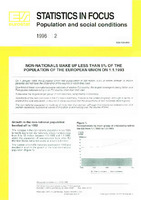| dc.contributor.author | Eurostat |
| dc.date.accessioned | 2020-09-29T08:55:16Z |
| dc.date.available | 2020-09-29T08:55:16Z |
| dc.date.issued | 1996 |
| dc.identifier.isbn | 1024-4352 |
| dc.identifier.uri | https://ketlib.lib.unipi.gr/xmlui/handle/ket/2881 |
| dc.description | Downloaded from EU Bookshop. |
| dc.description | http://aei.pitt.edu/id/eprint/85132 |
| dc.description | 1996.2 |
| dc.description.abstract | On 1 January 1993, the European Union had a population of 368 million, 4.8% of whom (almost 18 million persons) did not have the citizenship of the country in which they lived. One-third of these non-nationals were nationals of another EU country, the largest contingents being Italian and Portuguese nationals living in an EU country other than their own. Turks were the largest single group of non-nationals, living mainly in Germany. Two-thirds of the non-nationals in the EU live in Germany, France or the United Kingdom, although in terms of share of the total population, it was not in these countries that the proportions of non-nationals were highest. The non-national population is made up of more men than women, although this imbalance between men and women caused by successive waves of migration is diminishing over the course of time |
| dc.format.extent | 12p. |
| dc.publisher | Statistical Office of the European Communities and Social Statistics |
| dc.subject | Social Policy |
| dc.title | Statistics in Focus: Population and social conditions. NON-NATIONALS MAKE UP LESS THAN 5% OF THE POPULATION OF THE EUROPEAN UNION ON 1.1.1993. |
| dc.type | working document |
| dc.publisher.place | Luxembourg |

